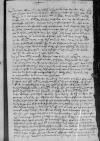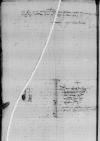V(er)gang(en) tag ist mir ein cf. Ioannes DANTISCUS to Hieronymus SAILER Brussels, 1531-02-12, CIDTC IDL 7460, letter lost⌊br(ief)fcf. Ioannes DANTISCUS to Hieronymus SAILER Brussels, 1531-02-12, CIDTC IDL 7460, letter lost⌋ von E(uer) G(naden) / des datt(ums) 12 Febrer in Brussels (Bruxellae), city in the Low Countries, Duchy of Brabant, since the regency of Mary of Hungary the capital of the Habsburg Netherlands, today the capital of Belgium⌊BrusselBrussels (Bruxellae), city in the Low Countries, Duchy of Brabant, since the regency of Mary of Hungary the capital of the Habsburg Netherlands, today the capital of Belgium⌋, / wol word(en). / Den brieff an die s(e)nora Isabel Delgada (†after 1546-06-15), Dantiscus' paramour during his stay in Spain, mother of his two children, Juana and Juan (Juan died in childhood)⌊Isabel DalgadaIsabel Delgada (†after 1546-06-15), Dantiscus' paramour during his stay in Spain, mother of his two children, Juana and Juan (Juan died in childhood)⌋ hab ich ir bey gwiser bottschaff gesant, / damit wider cf. Isabel DELGADA to Ioannes DANTISCUS Valladolid, 1531-03-07, CIDTC IDL 4880⌊andtwurtcf. Isabel DELGADA to Ioannes DANTISCUS Valladolid, 1531-03-07, CIDTC IDL 4880⌋ von ir / hie mit. Sy hatt mir sonst selb auch geschriben / und begert, ich zu ir kom / dan sy gantz determiniert ist, zu E(uer) G(naden) zu raiss(en). Hab ir wider geantt(wurte)t, wie der hoff jetz nach Ostern vo(n) hin gen Medina del Campo, town and castle in central Spain, Castile and León, 45 km SW of Valladolid⌊MedinaMedina del Campo, town and castle in central Spain, Castile and León, 45 km SW of Valladolid⌋ od(er) Valladolid (Vallisoletum, Oleti vallis), city in central Spain, Castile and León, on the Pisuerga river⌊ValladolitValladolid (Vallisoletum, Oleti vallis), city in central Spain, Castile and León, on the Pisuerga river⌋ v(er)ruck(en) w(ir)d, als dan mag ich zu ir kome(n), wan noch dess(en) willens wer, / wil ich ir um(m) guotte geselschafft v(er)helff(en), d(a)z sy in Biscay (Vizcaya, Bizkaia), province in northern Spain, Basque Country⌊BischayaBiscay (Vizcaya, Bizkaia), province in northern Spain, Basque Country⌋ und ub(er) Atlantic Ocean⌊merAtlantic Ocean⌋ hin aus faren mig / und mache(n) nach E(uer) G(naden) befelch d(a)z man ir ir pension gar zalle, / was v(er)folgt mag Eur G(naden) so bald ich zu ir kom anzaigt w(er)den. /
Ich hab dem s(e)nor Cornelis De Schepper (Cornelius Scepperus, Cornelis De Dobbele, Cornelius Duplicius) (*1503 – †1555), erudite, diplomat in the Habsburgs' service; close friend of Ioannes Dantiscus; initially in the service of Christian II of Oldenburg, King of Denmark; 1526 secretary and councillor to Emperor Charles V of Habsburg (CE, vol. 3, p. 218-220; DE VOCHT 1961, p. 15-24)⌊CornellisCornelis De Schepper (Cornelius Scepperus, Cornelis De Dobbele, Cornelius Duplicius) (*1503 – †1555), erudite, diplomat in the Habsburgs' service; close friend of Ioannes Dantiscus; initially in the service of Christian II of Oldenburg, King of Denmark; 1526 secretary and councillor to Emperor Charles V of Habsburg (CE, vol. 3, p. 218-220; DE VOCHT 1961, p. 15-24)⌋ v(er)gang(en) tag villerlay geschr(ibe)n, aber bis her noch kain antt(wor)t vo(n) im gehapt. / Sich wol, das ichs nit allain bin, / der ungern schreipt, / gelieb E(uer) G(naden) / im mein dienst und gruos zu sag(en) / und d(a)z mich nach brieff von im v(er)langt. / Cornelis De Schepper (Cornelius Scepperus, Cornelis De Dobbele, Cornelius Duplicius) (*1503 – †1555), erudite, diplomat in the Habsburgs' service; close friend of Ioannes Dantiscus; initially in the service of Christian II of Oldenburg, King of Denmark; 1526 secretary and councillor to Emperor Charles V of Habsburg (CE, vol. 3, p. 218-220; DE VOCHT 1961, p. 15-24)⌊ErCornelis De Schepper (Cornelius Scepperus, Cornelis De Dobbele, Cornelius Duplicius) (*1503 – †1555), erudite, diplomat in the Habsburgs' service; close friend of Ioannes Dantiscus; initially in the service of Christian II of Oldenburg, King of Denmark; 1526 secretary and councillor to Emperor Charles V of Habsburg (CE, vol. 3, p. 218-220; DE VOCHT 1961, p. 15-24)⌋ hatt mir auch v(er)haissen, / noch ettwas fur mich zu mache(n), dan im die zeit auff meinen abschid zu kurtz fiel, / d(a)z wil ich in auch gebett(en) und ermant haben. / Ich v(er)sich mich geg(en) herbst oder in end diss(en) jars wider ain rais hin aus zu thon, / wa Charles V of Habsburg (*1500 – †1558), ruler of the Burgundian territories (1506-1555), King of Spain as Charles I (1516-1556), King of Naples and Sicily, King of the Romans (1519-1530), Holy Roman Emperor of the German Nation (elected 1519, crowned 1530, abdicated 1556); son of Philip I the Handsome and Joanna the Mad of Castile⌊kay(serliche) m(aieste)tCharles V of Habsburg (*1500 – †1558), ruler of the Burgundian territories (1506-1555), King of Spain as Charles I (1516-1556), King of Naples and Sicily, King of the Romans (1519-1530), Holy Roman Emperor of the German Nation (elected 1519, crowned 1530, abdicated 1556); son of Philip I the Handsome and Joanna the Mad of Castile⌋ die weil nit in Spain (Hispania)⌊Sp(anien)Spain (Hispania)⌋ kompt, so (ver)hoff ich E(uer) G(naden) auff ir jungst schreiben noch am hoff zu find(en), / als dann wils Gott die alt(en) (po)tschafft wider ernuyere(n). /
So vil E(uer) G(naden) sonst nuyer zeittong halb anzaig(en) thuott, / das regime(n)tz am hoff / und wie ma(n) sich des Suleiman the Magnificent (*1494 – †1566), 1520-1566 Sultan of the Ottoman Empire⌊Turck(en)Suleiman the Magnificent (*1494 – †1566), 1520-1566 Sultan of the Ottoman Empire⌋ besorgt, / Gott schick all ding zom besten / in diss landen ist gar nichs nuys d(a)z zu schr(eibe)n sey, / dan an disen hoff ain betriebt langweillig leben ist. / Wil E(uer) G(naden) undertanigklich gebett(en) haben, / was nuy zeittong farfelt und v(er)hand(en) ist / mir teglich auch zu schr(eibe)n oder lassen anzaig(en), / dan was vo(n) E(uer) G(naden) kompt gib ich mer glaub(en) dan vo(n) andr(en) leutt(en). / Dem Reynaldus Strozzi (Reynaldo Strozzi), banker; probably a member of Florentine family of Strozzi - one of the major bankers of the French Crown (TRACY, p. 96, footnote 19)⌊Rinaldo StrozziReynaldus Strozzi (Reynaldo Strozzi), banker; probably a member of Florentine family of Strozzi - one of the major bankers of the French Crown (TRACY, p. 96, footnote 19)⌋ und Albrecht Cuon (Kohn) (†after 1559), a German merchant from Nuremberg, and the Welsers' factor in Spain (Oberdeutsche Kaufleute, p. 36, footnote 122)⌊Albrecht(en)Albrecht Cuon (Kohn) (†after 1559), a German merchant from Nuremberg, and the Welsers' factor in Spain (Oberdeutsche Kaufleute, p. 36, footnote 122)⌋ hab ich vo(n) Eur G(naden) wegen vil gruos und dienst entbott(en), / wais sonst auff diss mal nichs besonders zu schr(eibe)n. /
Iner halb 8 tag(en) wirt ain guotter gesell, Hans Schad (fl. 1531)⌊Hans SchadHans Schad (fl. 1531)⌋ genant, / ist von unss(er)m haus hin aus reitt(en) / am hoff komen / und E(uer) G(naden) vo(n) meint weg(en) anspreche(n). / Ist mein undertanig begere(n), / im ains guott geschier mache(n) / wie wol er in diss landen schier aus der gewonhait kom(en) ist, doch formals / ain guoter metgscher und bierrsauffer sauffer gemast. / Dem vo(n) probably Ulrich Ehinger (*1485 – †1537), Augsburg banker, member of the Ehinger family of German merchants, one of the most important German merchants in Spain (probably as the Welsers' agent); brother of Heinrich Ehinger; counselor to Emperor Charles V’s (knighted by the Emperor in the Order of Santiago) (DE VOCHT 1961, p. 298; NDB 4 Ehinger, p. 344; ZELINSKY HANSON, p. 123 and footnote 46; EIRICH, p. 170)⌊Ehingerprobably Ulrich Ehinger (*1485 – †1537), Augsburg banker, member of the Ehinger family of German merchants, one of the most important German merchants in Spain (probably as the Welsers' agent); brother of Heinrich Ehinger; counselor to Emperor Charles V’s (knighted by the Emperor in the Order of Santiago) (DE VOCHT 1961, p. 298; NDB 4 Ehinger, p. 344; ZELINSKY HANSON, p. 123 and footnote 46; EIRICH, p. 170)⌋ und an der guott(en) freund(en) gelieb E(uer) G(naden) vil grus und dienst von mir zu sagen. /
Damit wil ich mich  BCz, 1595, p. 236 als Eur G(naden) willig(er) befolhen habenn. / Gott sey mit uns allen.
BCz, 1595, p. 236 als Eur G(naden) willig(er) befolhen habenn. / Gott sey mit uns allen.
 BCz, 1595, p. 236 als Eur G(naden) willig(er) befolhen habenn. / Gott sey mit uns allen.
BCz, 1595, p. 236 als Eur G(naden) willig(er) befolhen habenn. / Gott sey mit uns allen.

